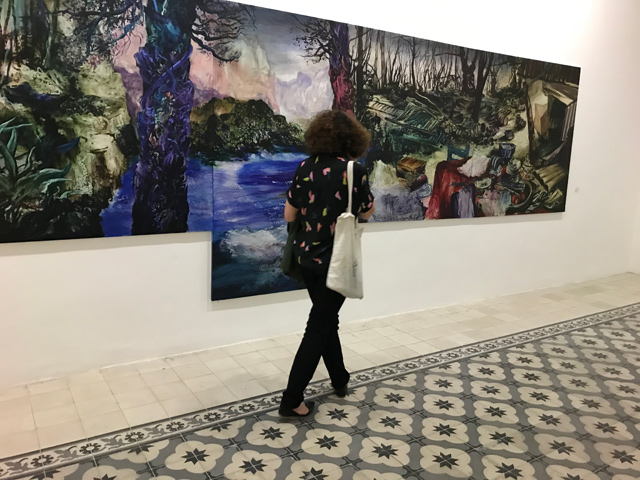AMMAN — An exhibition titled “Three Artists, Three Generations” showcasing works from Bady Dalloul, Ziad Dalloul and Maha Maamoun opened at Darat Al Funun on Tuesday.
The exhibition features “a convergence of individual styles by artists who are at different stages of their careers, and who each follow their own path, questioning familiar narratives, histories and memories”, according to Darat Al Funun’s website.
Syrian artist Ziad Dalloul, who was born in 1953, represents the “older generation”. He is now “one of Syria’s most established artists”, according to the organisers.
Dalloul has been based in Paris since the early 1980s and his work comprises paintings, etchings and artist books. For this exhibition, Dalloul created “The sky is low, the sea is deep (2019)”, a five-and-a-half metre long quadriptych painting depicting “a four-part tragedy”, the organisers said.
His son, French-Syrian artist Bady Dalloul was born in 1986 in Paris, and represents the “younger generation”. Working with text, drawings, video and objects, he “confronts and brings together the imaginary and the real, while challenging the process of writing history”, the organisers said.
He is showcasing two works of art. His installation “A country without a door or a window (2016/2019)” consists of 200 small drawings presented in a collection of matchboxes, together forming a constantly interrupted timeline depicting multifaceted scenes of daily life in the Syrian war, he said.
His film, “Discussion between Gentlemen (2016)” shows an old map of the Middle East from 1920, in which “two hands drawing random lines” are depicted, and with “the whole map destroyed in the process”.
“I collected these pictures from afar, as I live in Paris,” he said about his installation. “When the war broke out, I was very shocked like everyone to see all these pictures everywhere in the newspapers, internet and on television. So I started drawing these small-sized pictures, so that we could see a continuous sequence of pictures...”
This is the first time Bady Dalloul is presenting his work alongside his father’s, he told The Jordan Times in a recent interview.
Born in Oakland, CA in 1972, Maha Maamoun represents the “middle generation”. She lives in Cairo, and works primarily with the mediums of text, photography and video, according to the organisers.
In the exhibition, she is presenting three works. Her installation “The Subduer (2017)” is a “subtle commentary on the sublime and banal machinations of bureaucracy”.
Her 2009 film “Domestic Tourism II” takes “a humourous but dark look at how the pyramids have been appropriated across years of cinema production in Egypt to reflect or construct personal narratives and official histories”.
Her video “Dear Animal (2018)” interweaves two narratives, moving back and forth between the cinematic short story of Egyptian writer Haitham El-Wardany and the diaristic notes written and read by Egyptian director and producer Azza Shaaban, according to the organisers.
“Clearly you cannot say that each artist represents a generation, but they all have a different perspective and their own way of working”, said Eline van der Vlist, Darat Al Funun’s artistic director, in an interview with The Jordan Times on Tuesday.
“All the works deal, in a way, with how there is a lot outside of the official histories,” van der Vlist added.
The exhibition runs until January 16, 2020 and entrance is free of charge, according to the organisers.
